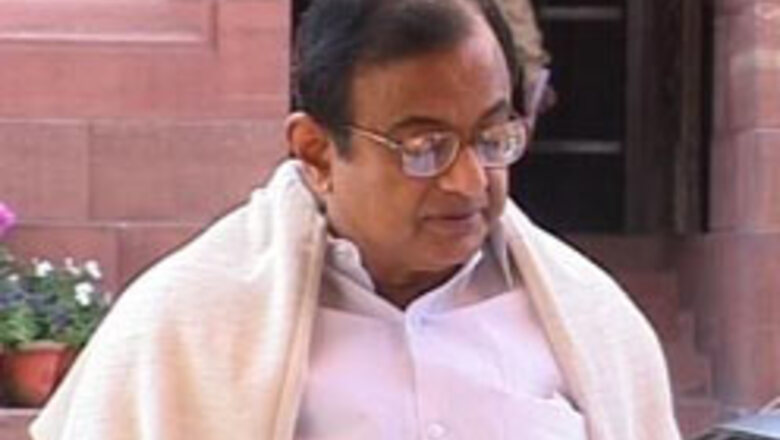
views
New Delhi: Finance Minister P Chidambaram on Monday put up a strong defence of the Indo-US nuclear deal and tore into the NDA and Left parties, saying there can be "nothing more bizarre" than two disparate groups coming together to vote against the Government on the confidence motion.
Opening the UPA attack on the second day of the debate on confidence motion moved by Prime Minister Manmohan Singh, he said the country is charting a "new path" for ending its nuclear isolation and making India an economic superpower.
"I ask the House to give a resounding vote of confidence to the Prime Minister," he said amid thumping of desks by the treasury benches in a speech that was repeatedly interrupted by the Left parties, especially the CPI(M).
Amid cheers from the ruling side members, Chidambaram took barbs at the NDA and Left parties for coming together to vote against the Government despite having diverse positions on the nuclear deal.
BJP AND LEFT: POLAR OPPOSITES
"The BJP and NDA seem to believe that nuclear isolation should end but no one is clear about the Left parties. Yet the two groups are voting together. The NDA has no problem with the strategic relationship with the US. The Left parties have ideological opposition to it. Yet the two groups are voting together," he said.
"The NDA believes in India becoming a nuclear weapon state. The Left parties have always opposed nuclear weaponisation. Yet the two parties are together. The NDA says if it comes to power, it will renegotiate the nuclear deal. The Left says it will everything to scuttle the agreement for ever. Yet they are voting together. I don't think in the history of Parliament there is anything more bizarre than two disparate groups voting together," the Finance Minister said in his spirited speech.
He also stated said while the NDA wanted India's nuclear isolation to end, "no one is clear about the stand of the Left parties".
Attacking the NDA for opposing the deal, Chidambaram cited former prime minister Atal Behari Vajpayee's government's efforts to forge a strategic partnership with the US and said the UPA government was only taking that dialogue forward.
"The question is do we want to come out of nuclear isolation?" he asked the BJP benches.
On BJP's contention that the nuclear deal will restrain India from conducting any further tests, he referred to the speech by Vajpayee in the United Nations after the 1998 nuclear tests when he announced a voluntary moratorium on tests which amounted to de jure acceptance of provisions of the Comprehensive Test Ban Treaty (CTBT).
Vajpayee, he said, had even offered to have discussions on the signing of the CTBT.
The former prime minister had also, in a speech in Parliament in 1999, said the country did not need to conduct any further tests as scientists did not feel the requirement. The voluntary moratorium also did not restrain India from conducting future tests, the minister said.
HYDE ACT NOT BINDING
Chidambaram, a member of the now defunct UPA-Left committee on the nuclear deal, also allayed apprehensions that the Hyde Act of the US would bind India with regard to its strategic programme and autonomy.
PAGE_BREAK
"The Hyde Act cannot be invoked. The Hyde Act cannot bind India. The 123 agreement alone will delineate the rights and responsibilities of the two parties. Under the Vienna Convention, we are only bound by the 123 Agreement," he said.
He said the Hyde Act was a matter of domestic law of the US and the American President has powers to override its provisions.
Rejecting opposition to 123 Agreement with the US, Chidambaram said India has negotiated such pacts with not only America but also with Russia and France, but said that "these cannot be operationalised till the IAEA and Nuclear Suppliers Group give their nod".
Chidambaram said India was not concerned about the internal processes in the US like their Atomic Energy Act as it had no relation to the 123 Agreement. "The 123 Agreement nearly fleshes out the Hyde Act," he said.
GOING BEYOND CHINA
Dismissing Left charges of betrayal, he said the Government had taken all steps in the implementation of the Indo-US nuclear deal in the "most transparent manner".
On the controversy over making public the text of safeguards agreement with IAEA, he said the draft was unveiled, as promised, the moment India gave a nod for its circulation among the IAEA Board of Governors.
PAGE_BREAK
In an apparent dig at the Left, Chidambaram cited China's nuclear programme since 1970 and gave statistics to show how the giant neighbour was making rapid economic progress.
When CPI(M) member Rupchand Pal interjected that India should not be compared with China, the Finance Minister took a swipe, saying "there are some people in the country who do not want India to grow beyond and above China and do not want India to become a superpower."
Drawing parallels between the economies of the two countries, the Finance Minister said China produces 419 million tonnes of steel, while India's capacity is only to produce 44 million tones.
He reminded the Left parties that China was producing 2482 million tonnes of coal against 427 million tonnes produced by India. Similarly, the electricity production in China was four times of India.
"I have no hesitation in saying that I do not envy China, but I also want to emulate China. I want India to become an economic superpower," he said, adding, "We must aspire for greater heights. We must emulate the best in the world."
He said China was planning multi-fold increase its nuclear power production capacity from the present two per cent level. The country was also intending to raise its nuclear power production to 50,000 MW by 2020 and then to 1,60,000 MW by 2030, and that Beijing was cooperating with countries like France, Canada and Russia in this endeavour.
The Finance Minister also said the communist giant at present had 11 nuclear reactors - six under construction - and that several more were being planned.
Winding up his speech, Chidambaram said, "The future is in our hands. We can make our future if we have the vision and the farsightedness."
Recalling the ushering in of reforms during the days of late Rajiv Gandhi and P V Narasimha Rao, he said the present Government is starting a "new path which will end the nuclear isolation and make India stronger".
PHENOMENAL ECONOMIC GROWTH
Chidambaram said India's GDP growth in the fiscal year 2007/08 was close to 9.1 per cent said in Parliament, giving a "resounding start to the 11th five-year plan".
Chidambaram said that the government had, in the last four years, sustained a growth rate of 8-9 per cent.
"2007-08 is a watershed year not only in our growth rate but also for a record production of wheat, rice and other foodgrains," he said.
He also said that farm credit growth this year it would cross the target of Rs 2,80,000 crore as against Rs 2,50,000 crore last year.
"We have addressed the need of farmers in a systematic way," he said, adding, "Show me any other four-year period in which so much has been achieved," he challenged the opposition.
He pointed out that the growth rate during the six years of rule of the BJP-led National Democratic Alliance government was just between 5-6 per cent.




















Comments
0 comment